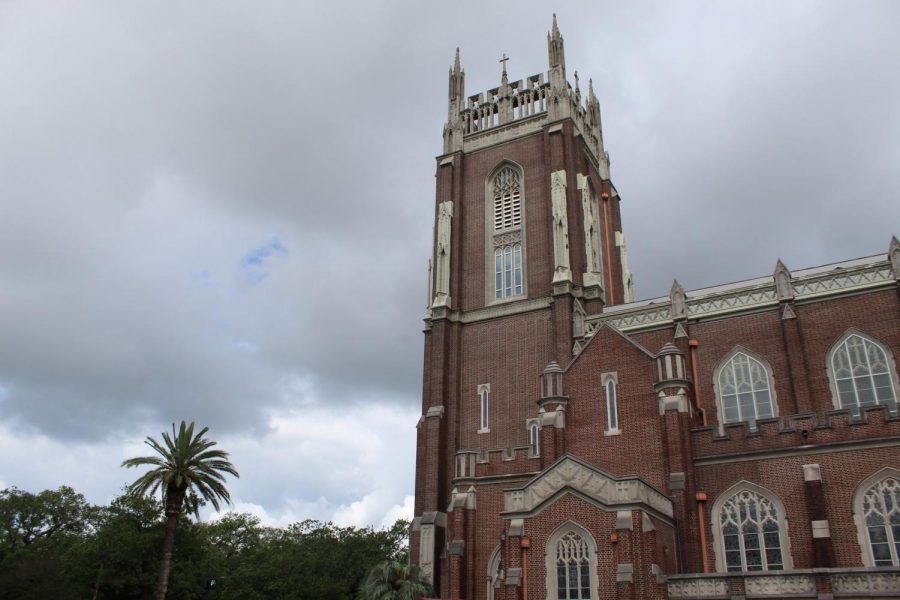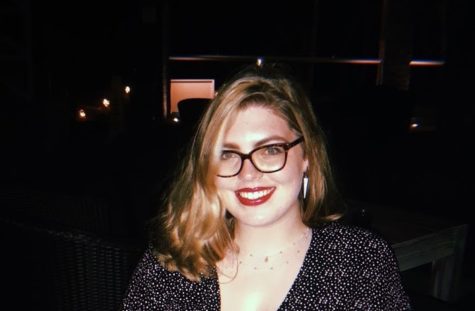Housing displacement, social distancing to come with return to campus in the fall
Holy Name of Jesus Church sits under a cloud of fog on May 17, 2020. President Tania Tetlow announced May 20 that the university will resume on-campus classes in August despite the COVID-19 pandemic.
May 21, 2020
The recent news that Loyola will return to campus for the fall semester, starting Aug. 24, and the announcement that upperclassmen will not be given on-campus housing have left many with questions, wondering what on-campus life will look like amidst the ongoing COVID-19 pandemic.
University President Tania Tetlow said the university is working to address student and community concerns, but many policy decisions are still in the works.
“We know we haven’t given clarity for every student. But we didn’t want to miss the chance to start giving clarity for most students,” Tetlow said. “I wish beyond measure that I had certainty to give. I know that students are drowning in uncertainty right now and its really hard to handle. What we are going to do is keep giving information as soon as we have it.”
To calm this uncertainty, Tetlow sat down with The Maroon to answer some of the most pressing questions about what life will look like when students return to St. Charles Avenue.
What will happen to on-campus housing?
In order to minimize social contact, the university will be paring down the number of students in on-campus housing to maximize the number of single-resident rooms and prioritizing providing residence hall rooms to first and second-year students.
The number of beds on campus will be decreased by roughly one third from around 1,488 to 964.
As a result, the university is asking juniors, seniors and graduate students who are currently signed up for on-campus rooms for the fall to find other living arrangements. Students who previously thought they had guaranteed on-campus housing for the fall were notified via a May 21 email that the university would no longer be providing them with housing.
Tetlow said it was a difficult decision to ask upperclassmen to leave campus, but a necessary one in order to promote social distancing within residence halls while also providing incoming freshmen with necessary resources.
“We are prioritizing the newest and youngest students, particularly incoming first years who obviously most need housing, many of whom are new to New Orleans and are just beginning to create a community in Loyola,” Tetlow said. “That’s a painful decision for us and we are going to work with those (displaced) students as best we can with the rental market,” Tetlow said.
Displaced students are allowed to petition the university to let them stay in on-campus housing if they have mobility issues or unique circumstances.
The email out to upperclassmen also included a link to local rentals along with a survey asking if students would be interested in participating if the university provides semester-long hotel accommodations in place of on-campus housing.
The university also told upperclassmen who are Ignatian Scholars with paid-for on-campus housing that “the university will honor our commitment to you despite the recent announcement regarding housing.”
On-campus living will most likely be able to accommodate sophomore students, but Telow said students who were previously required to live in residence halls during their second year at Loyola will have the option to move off campus if desired.
Loyola is working to maximize the number of single rooms on campus, but the number of on-campus students is dependent on sophomore living arrangements.
“We know that, and we are figuring out what that may look like,” Tetlow said. “There is no magic answer about what is safe and what isn’t, but having less density will make it safer.”
Tetlow acknowledged that the changes in on-campus accommodations for upperclassmen is not only a revenue loss for the university, but a disruption to the lives of many students.
“None of these realities allow for a whole lot of notice,” Tetlow said.
Decisions about what the cost of on-campus housing will look like for students are still in the works.
What will happen if there is a positive case on campus?
The university is partnering with Ochsner to increase access to testing both within student health services and at Ochsner facilities in the city.
“If we see a diagnosis on our campus, Oschner will be able to come in and test the people who have been exposed to that person who has gotten the virus,” Tetlow said. “That will allow us to continue to function and not have a world like we did in the spring where anyone who had a fever had to just isolate for two weeks, or anyone who thought they might be exposed, there was just no chance to get tested.”
Tetlow said Loyola will rely on ‘contact tracing’ to test all students and community members who have had contact with people who have tested positive for COVID-19. But the university will need to rely on community members wearing masks and limiting their social interactions both on and off campus.
“We are still figuring out enforcement issues but, honestly, my hope and expectation is that what we want to do and what works best is that we persuade people that this is how we care about each other,” Tetlow said. “It feels like this ultimate moment in how we are rooted in our faith and the values that we espouse where we are going to show each other how much we care about each other, and none of that is meant to be about restricting individual freedom.”
How will on-campus dining and classes work?
On-campus dining, including the OR, plans to re-open with limited seating and more to-go options as well as outdoor seating. Students will be encouraged to sit in groups according to those they live with and interact with regularly to limit the potential spread of COVID-19.
Classes will follow similar guidelines, with distanced seating and more hybrid online and in-person class options.
“We are going to be flexible. I know for students who have health vulnerabilities, we will figure out with them whether they want to be on campus ,” Tetlow said.
The university is considering the feasibility of allowing students to take the year entirely online, however Tetlow said it may be dependent on students’ majors.
“We have online programs, but that program may not exactly match every class that students are taking right now,” Tetlow said.
What does this mean for the university’s finances?
“The pandemic will clearly have some impact on the university’s finances, it already has,” Tetlow said. “Like almost every university in America, this is having a financial impact on us right now.”
In addition to a decrease in revenue from residence halls, Tetlow said the university’s reliance on on-campus filming and hosting conferences will affect Loyola’s finances.
However, the university has not yet dipped into its endowment or made a decision about doing so. Tetlow said whether or not the endowment is used to support the university financially will depend on what the coming months bring.
When it comes to whether the university will be furloughing employees or cutting staff pay, Tetlow did not say whether or not those options are on the table
“I don’t think there is an institution or organization or company in America right now that isn’t talking about all the ways that they will make sure they get through this crisis. I don’t think it makes sense for me to speculate about that,” Tetlow said.









Janna Saslaw • May 21, 2020 at 2:32 pm
Lol. It’s “Ignatian” Scholars. Ignition is probably what autocorrect thought it was.